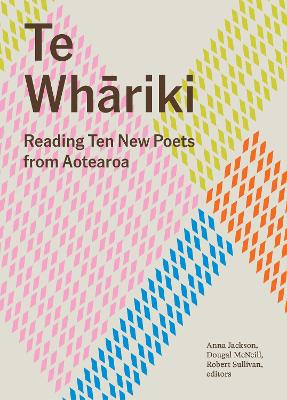Review: Te Whāriki: Reading Ten New Poets from Aotearoa
'This book encourages close reading and gifting - between poems, collections, poets, and generations. The writing is rich and complex, yet offered in a way accessible to anyone with an interest in literature...'
The editors of Te Whāriki: Reading Ten New Poets from Aotearoa (Auckland University Press) - Anna Jackson, Dougal McNeill, and Robert Sullivan - welcome readers to this slim volume by making their intentions clear. This is a weaving, not a ranked or juried collection like Ōrongohau | Best New Zealand Poems, or Poetry Aotearoa Yearbook. They share their kaupapa in the editorial, stating:
‘We want this book to do several things. We want to build communities, to celebrate fellow writers and to give extended critical attention to writers who are doing exciting things. The kind of criticism we are interested in is less about finding fault than finding ways of understanding, with the aim of enhancing the experience of reader and writer. Poems are a gift from a writer to a community; critical readings can return this gift’.
Within this framework, the act of reading is akin to a koha, and this book encourages close reading and gifting - between poems, collections, poets, and generations. The writing is rich and complex, yet offered in a way accessible to anyone with an interest in literature: There are many strands to connect to, whether you want to learn to engage with deep reading, strengthen your writing practice, or simply connect with an emerging snapshot of Aotearoa literature.
The poets celebrated in this pukapuka hold many different identities, and yet they carry a shared whakapapa: almost all of the poets featured here studied creative writing at the International Institute of Modern Letters, and went on to publish books with either Auckland University Press or Te Herenga Waka University Press. Furthermore, the book includes our three most recent New Zealand Poet Laureates (analysis by David Eggleton, a feature on Chris Tse, and editing by our newly-appointed Robert Sullivan). It’s likely that a future Poet Laureate is among those gathered here, too. On the one hand, this is a marker of skill, dedication, and mentorship; on the other, I wonder how talents are consistently nurtured outside of this institutional pipeline.
Perhaps pre-empting this question, the editors urge, ‘We encourage readers to look elsewhere as well, to the recent fine anthologies that have gathered diverse communities, diverse voices…’. Following the introduction, we enter an essay by Amy Marguerite on the successes and potential of independent literary journals such as Sweet Mammalian, Kupu Toi Takataapui, Symposia, and the sadly-closing bad apple. Many of these are run by our featured poets, who intentionally offer lifelines to those outside the mainstream, myself included.
Our next essay is by Tru Paraha who offers a stunning deep dive into the world of visual poetry, from whakairo, raranga, and tā moko, to blackout poetry, Y2K-coded digital works, and hand-painted imagery-and-verse. This one chapter could be essential teaching in any class on art, design, literature, or social sciences, and I hope that it will inspire people to engage in visual poetics as a creative exploration. This chapter also shows the interwoven strands of inspiration and referencing between poets such as Teresia Teaiwa, Albert Wendt, Melanie Rands, Selina Tusitala Marsh, Pelenakeke Brown, Tusiata Avia, Vanessa Mei Crofskey, and Tate Fountain.
From there, the structure shifts to call-and-response: a few pieces by each featured poet, along with a short reflection on their work and what calls them to write. Guest writers analyze what makes these poets' works sing. Writers on both sides give rich insights into leaning into craft, inventing form, and defying genre, without being overbearing - leaving readers likely to reference this volume again and again.
I finished this book with a feeling of possibility. These poets tackle climate change and emergency, desire and identity. They see themselves as wolves and monsters, echoes of the Pasifika or Grecian mythic, they see us all braided together facing an uncertain future. These writers reflect on friendship, solidarity, and privilege in our current and ever-more urgent circumstances. They are as likely to headline an international literature festival as they are to start an open-mic fundraiser at an underground bar - and I think they’d like to welcome you there.
